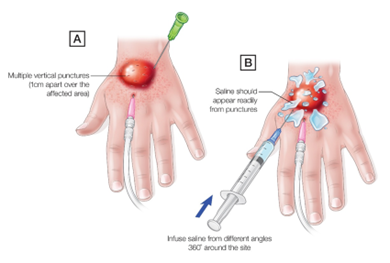Nursing Interventions
Nursing Interventions ( 4 Questions)
A nurse is administering chemotherapy to a patient who has colon cancer via an intravenous (IV) line. The nurse should monitor the IV site closely for signs of extravasation, which is:
This is the definition of extravasation, which is a rare but serious complication of intravenous chemotherapy. Extravasation can cause tissue damage or necrosis, especially if the drug is a vesicant (a highly toxic substance that causes blisters). The nurse should monitor the IV site closely for signs of extravasation, such as tingling, burning, swelling, redness, or discomfort. If extravasation occurs, the nurse should stop the infusion immediately and follow the appropriate protocol to minimize the harm.
This is the definition of thrombophlebitis, which is inflammation of a vein due to a blood clot. Thrombophlebitis can occur as a complication of IV therapy, but it is not the same as extravasation. The nurse should monitor the IV site for signs of thrombophlebitis, such as redness, warmth, and tenderness along the vein. If thrombophlebitis occurs, the nurse should discontinue the IV line and apply warm compresses to the affected area³.
This is the definition of infiltration, which is the leakage of fluid into the tissues due to a dislodged or punctured IV catheter. Infiltration can cause edema, pallor, and decreased skin temperature around the IV site. Infiltration can also occur as a complication of IV therapy, but it is not as serious as extravasation. The nurse should monitor the IV site for signs of infiltration, such as swelling, coolness, or dampness. If infiltration occurs, the nurse should stop the infusion and remove the IV line³.
This is the definition of occlusion, which is the blockage of an IV catheter by a precipitate (a solid substance that forms when two solutions are mixed). Occlusion can cause reduced or absent flow rate and increased pressure in the IV line. Occlusion can also occur as a complication of IV therapy, but it is not related to extravasation. The nurse should monitor the IV line for signs of occlusion, such as difficulty in flushing or infusing fluids. If occlusion occurs, the nurse should try to clear the catheter by flushing with saline or heparin³.
Choice A reason:
This is the definition of extravasation, which is a rare but serious complication of intravenous chemotherapy. Extravasation can cause tissue damage or necrosis, especially if the drug is a vesicant (a highly toxic substance that causes blisters). The nurse should monitor the IV site closely for signs of extravasation, such as tingling, burning, swelling, redness, or discomfort. If extravasation occurs, the nurse should stop the infusion immediately and follow the appropriate protocol to minimize the harm.
Choice B reason:
This is the definition of thrombophlebitis, which is inflammation of a vein due to a blood clot. Thrombophlebitis can occur as a complication of IV therapy, but it is not the same as extravasation. The nurse should monitor the IV site for signs of thrombophlebitis, such as redness, warmth, and tenderness along the vein. If thrombophlebitis occurs, the nurse should discontinue the IV line and apply warm compresses to the affected area³.
Choice C reason:
This is the definition of infiltration, which is the leakage of fluid into the tissues due to a dislodged or punctured IV catheter. Infiltration can cause edema, pallor, and decreased skin temperature around the IV site. Infiltration can also occur as a complication of IV therapy, but it is not as serious as extravasation. The nurse should monitor the IV site for signs of infiltration, such as swelling, coolness, or dampness. If infiltration occurs, the nurse should stop the infusion and remove the IV line³.
Choice D reason:
This is the definition of occlusion, which is the blockage of an IV catheter by a precipitate (a solid substance that forms when two solutions are mixed). Occlusion can cause reduced or absent flow rate and increased pressure in the IV line. Occlusion can also occur as a complication of IV therapy, but it is not related to extravasation. The nurse should monitor the IV line for signs of occlusion, such as difficulty in flushing or infusing fluids. If occlusion occurs, the nurse should try to clear the catheter by flushing with saline or heparin³.

